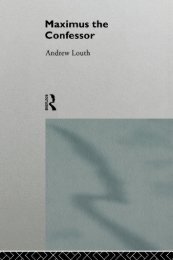Gospels of Thomas and Philip and Truth - Syriac Christian Church
Gospels of Thomas and Philip and Truth - Syriac Christian Church
Gospels of Thomas and Philip and Truth - Syriac Christian Church
Create successful ePaper yourself
Turn your PDF publications into a flip-book with our unique Google optimized e-Paper software.
doomed to disappointment.... The Bible student is soon, <strong>and</strong> perhaps unconsciously,<br />
caught up in the personal ministry <strong>of</strong> Paul. Peter, though prominent at first, is later<br />
ignored, as the Acts unfolds for the reader the story <strong>of</strong> Paul <strong>and</strong> his friends.... There<br />
is absolutely no evidence that Paul ever recognized the ‘primacy’ <strong>of</strong> Peter.<br />
Ronald Brownrigg, The Twelve Apostles (1974): The letters <strong>of</strong> Paul present a<br />
marked contrast to Luke's writings [in his Gospel <strong>and</strong> the Acts]. Whereas Luke<br />
suggests that the Apostles were a closed corporation <strong>of</strong> twelve governing the whole<br />
<strong>Church</strong>, Paul disagrees, claiming his own Apostleship to be as valid as any <strong>of</strong> the<br />
twelve.... Certainly Paul knew no authority <strong>of</strong> the twelve.... The qualification for<br />
Apostleship, at the election <strong>of</strong> Matthias [Ac 1:15-26], had been a divinely guided<br />
selection <strong>and</strong> a constant companionship with Jesus throughout his [active] lifetime.<br />
Elaine H. Pagels, The Gnostic Paul (1975); The Gnostic <strong>Gospels</strong> (1979): Two<br />
antithetical traditions <strong>of</strong> Pauline exegesis have emerged from the late first century<br />
through the second. Each claims to be authentic, <strong>Christian</strong>, <strong>and</strong> Pauline: but one<br />
reads Paul anti-gnostically, the other gnostically.... Whoever takes account <strong>of</strong> the<br />
total evidence may learn from the debate to approach Pauline exegesis with<br />
renewed openness to the text. || One version <strong>of</strong> this story [<strong>of</strong> Paul's conversion]<br />
says, ‘The men who were traveling with him stood speechless, hearing the voice but<br />
seeing no one’; another says the opposite,... ‘Those who were with me saw the light,<br />
but did not hear the voice <strong>of</strong> the one who was speaking to me.’<br />
Paul Johnson, A History <strong>of</strong> <strong>Christian</strong>ity (1976): The Christ <strong>of</strong> Paul was not<br />
affirmed by the historical Jesus <strong>of</strong> the Jerusalem <strong>Church</strong>.... Writings ... by <strong>Christian</strong><br />
Jews <strong>of</strong> the decade <strong>of</strong> the 50's [AD] present Paul as the Antichrist <strong>and</strong> the prime<br />
heretic.... The Christology <strong>of</strong> Paul, which later became the substance <strong>of</strong> the<br />
universal <strong>Christian</strong> faith,... was predicated by an external personage whom many<br />
members <strong>of</strong> the Jerusalem <strong>Church</strong> absolutely did not recognize as an Apostle.<br />
Irving Howe, World <strong>of</strong> our Fathers (1976): The view that sexual activity is<br />
impure or at least suspect, so <strong>of</strong>ten an accompaniment <strong>of</strong> <strong>Christian</strong>ity, was seldom<br />
entertained in the [east-European Jewish] shtetl. Paul's remark that it is better to<br />
marry than to burn would have seemed strange, if not downright impious, to the<br />
Jews.<br />
John Morris Roberts, History <strong>of</strong> the World (1976): The reported devotional<br />
ideas <strong>of</strong> Jesus do not go beyond the Jewish observances; service in the Temple,<br />
together with private prayer, were all that he indicated. In this very real sense, he<br />
154




